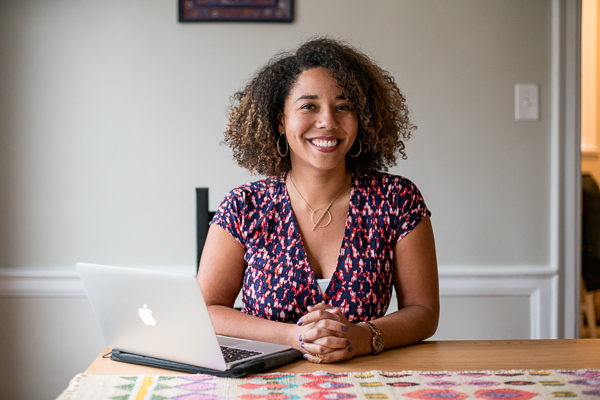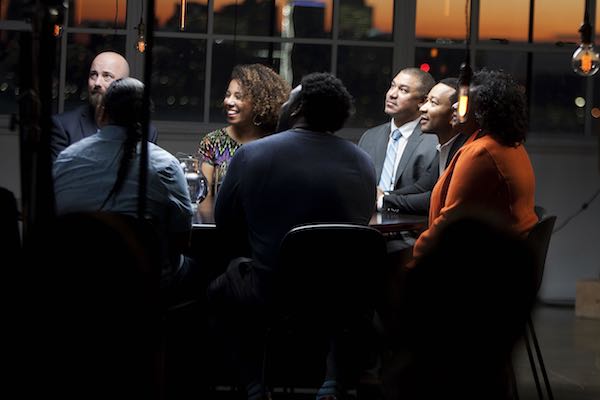Restorative justice city: One woman’s quest to create a more just Detroit
The Detroit Justice Center will provide community legal services to underserved Detroiters, support other equity organizations, and promote "just city" initiatives with the ultimate goal of creating a more just Detroit.

Amanda Alexander once represented a client who gave birth while incarcerated. Convicted for a “relatively minor offense,” according to Alexander, the woman didn’t know she was pregnant until she got to prison.
After the delivery, the mother got to spend a mere 24 hours with her daughter before Child Protective Services took her away. Fortunately, Alexander and her organization, the Prison & Family Justice Project at University of Michigan Law School, got the grandmother to show up to the first hearing and for the court to place the baby in her guardianship until the mother was released from prison.
While that situation resolved itself in everyone’s best interest, that’s often not the case. “Because of something as minor as passing bad checks that could mean a mother losing her children and family—permanently,” says Alexander.
That case, and others like it, convinced Alexander a multi-pronged approach to mass incarceration was needed. For years, she engaged others in the field and thought about what efforts could lead to systemic change instead of fighting on a case-by-case basis. And after that lengthy period laying groundwork, Alexander launched the Detroit Justice Center in December 2017.
The nonprofit will provide traditional community legal services to underserved Detroiters. But it will also support other organizations in this effort and promote “just city” initiatives with the ultimate goal of creating a more just Detroit.
Returning home
The Detroit Justice Center (DJC) has set itself an ambitious agenda. It’s also one Alexander has ample experience in. In fact, getting her law degree at Yale University was just the culmination of years of prior work in social justice.
It all started, really, when Alexander was in kindergarten near Kalamazoo. That’s when her father was convicted and sentenced to two years in prison. Looking back, however, the experience showed her the power of support systems. Because of her self-described middle-class privilege, a mother who drove them regularly to prison visits, and a supportive teacher who encouraged her to write her father letters, they maintained their relationship.
“I am fortunate to have a lifelong relationship with my father,” says Alexander. “For so many families I work with, that’s not the case.”
But prison reform was “too close to home” for her to work on initially, which is why much of Alexander’s background is in activism and community organizing. While an undergraduate at Harvard University, she helped found the Student Global AIDS Campaign, a student-based effort to end HIV and AIDS. From 2004 to 2006 she worked in South Africa as a research fellow for the Centre for Civil Society where she helped with capacity building for post-apartheid social movements that were fighting for HIV treatment, affordable housing, land redistribution, and environmental justice.
Over four years ago, after interning for the Bronx Defenders and getting her law degree, Alexander moved to Detroit because, she says, “I loved New York, I loved South Africa, but Michigan felt like my fight.”
She continued work that began at Yale and founded the Prison & Family Justice Project while working as an attorney in U-M Law School’s Child Advocacy Law Clinic, which serves families affected by incarceration and the foster care system. She also co-facilitates a prison justice workshop at Macomb Correctional Facility. (And really, this is just the CliffsNotes version of her professional experience—she also has a PhD from Columbia.)
Despite all her work fighting on behalf of the downtrodden and citing a bevy of statistics on the criminal justice system that are downright depressing—half of all black women have been affected by incarceration; families with an incarcerated member spend over $13,000 a year on various fees; by some estimates, the economy loses $1 trillion due to mass incarceration—she’s optimistic about what DJC can accomplish.
Creating a just city
The most fundamental of DJC’s three prongs will be its community legal services practice. The center will work on behalf of criminal-justice involved individuals, free of charge, to remove barriers that prevent them from becoming full citizens, like a warrant or suspended driver’s license. (Alexander prefers the term “criminal-justice involved individuals” to “returning citizens” because it encompasses those who have never been to prison.)
But because the need for these services in Detroit is so great, the DJC won’t have an open door intake policy. Instead they’ll partner with existing organizations and people, like job-skills programs and case managers, who will refer clients to them.
As part of its economic equity practice, the DJC will also provide affordable legal services to community organizations, cooperatives, and other initiatives that support or are led by returning citizens. For example, Alexander says the DJC would support something like the Detroit Skilled Trade Co-op, an idea discussed by some returning citizens to put their construction and demolition skills to use so they can bid on contracts cooperatively.
And then there is the third prong: promoting just city initiatives. Alexander wants to make Detroit the nation’s first “Restorative Justice City”—a movement started out of Oakland, California by Designing Justice + Designing Spaces which utilizes architecture, design, and real estate development to address the root causes of mass incarceration.
Alexander uses the case of the unfinished Wayne County jail on Gratiot Avenue as an opening for these deep discussions. “I think it was a real blessing that it didn’t get finished,” she says. “It allows us to hit pause and ask questions like, why are our jails overcrowded in the first place? How many in there can’t make bail? How many are there because of underlying issues like homelessness or substance abuse or mental health issues?
“For the cost of one jail,” she adds, “we could design 30 restorative justice wraparound service centers at every corner of the city.”
Alexander envisions the DJC as enhancing existing conversations in this space, instead of being the primary voice on this issue. She wants to promote programs like Hope Not Handcuffs, which seeks alternative treatment options for those addicted to drugs, and host Justice Hacks that will bring together important thinkers in the field to generate solutions to issues around mass incarceration.
The center has already begun some of its work by partnering on a national survey of women with incarcerated loved ones, and will soon be hiring attorneys and staff with the goal of being fully operational by this spring. It also plans to share office space with other mission-aligned nonprofits.
Alexander and her organization have already attracted a great deal of interest. Most recently, she was selected as part of the inaugural class of John Legend’s Unlocked Futures accelerator, a 16-month program for social entrepreneurs working in the criminal justice field. She was also named an Echoing Green Fellow, which provides recipients with seed funding and leadership development.

Alexander credits a number of influences, including the Detroit activist Grace Lee Boggs and the National Conference of Black Lawyers. One quote from Glenn Martin, founder of JusticeLeadershipUSA, really stands out to her.
“He said, ‘Those closest to the problem are closest to the solution, but furthest from resources and power.’ I think this is a way lawyers can show up—by amplifying people’s wisdom and solutions.”
Very soon, she will.
This article is part of “Detroit Innovation,” a series highlighting community-led projects that are improving the vitality of neighborhoods in Detroit, while recognizing the potential of residents to work with partners to solve the most pressing challenges facing their communities.
The series is supported by the New Economy Initiative, a project of the Community Foundation for Southeast Michigan that’s working to create an inclusive, innovative regional culture.
Photo by Nick Hagen.





